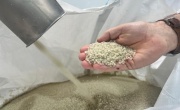Bury to introduce three-weekly collections in October
Bury Council will soon become the first council in England to adopt three-weekly collections of household residual waste, after the council cabinet approved plans to introduce the new service from the second week in October 2014.
At a cabinet meeting yesterday evening (16 July), councillors agreed to push forward with the proposals, which form part of the ‘Bury Zero Waste Strategy’, in a bid to boost the area’s recycling rate from its current level of around 47 per cent, to ‘more than 60 per cent’ by March 2016, while reducing carbon emissions and saving ‘more than £800,000 per year’ in waste treatment and disposal costs.
The council currently spends £10.2 million a year on treating and disposing of waste (approximately £28,000 a day), but says that ‘a lot of this waste could be recycled instead’. Indeed, it estimates that ‘only a relatively small amount of waste (around 25 per cent) needs to go in grey [residual waste] bins’.
On its website, the council writes: ‘It currently costs £283.72 to treat and dispose of just one tonne of residual grey bin waste whilst the council receives an income of £25 per tonne for recycling materials collected in the blue and green bins.
‘The financial and environmental implications are far too high to continue as we are.’
Collection details
As such, the frequency of residual waste collections will reduce to once every three weeks in October, while there will be an increase in the frequency of recycling collections.
This will mean that the kerbside collection system will be thus:
- grey bins (for residual waste) are to be collected once every three weeks (rather than fortnightly); and
- green bins (for paper and cardboard) and blue bins (for plastic bottles, glass bottles and jars, as well as food and drink cans) are to be collected once every three weeks (as opposed to monthly).
Brown bins (for garden waste and food waste) will experience no change and be collected every two weeks.
The changes do not affect those living in flats or apartments with communal bins however, and these properties will continue to be emptied fortnightly.
‘Space will stay the same as it is now’
Writing on its website, the council said: ‘Although we will be emptying grey bins less often (once every three weeks instead of two) we will be emptying blue and green recycling bins more often than we do now.
‘Because we will be emptying recycling bins more often the space [householders] will have each week will not change – across all… four bins the space will stay the same as it is now.’
It also highlighted recent studies that showed that any potential health hazard to residents from less frequent bin collections (e.g. from odour and gas emissions, flies, maggots and vermin) is ‘low and unlikely’.
However, Bury Council added that ‘larger families’ will be able to apply for an extra residual waste bin to store any excess non-recyclable waste, while any households that currently have smaller brown bins will be able to request an upgrade to a larger one. Householders will also be able to request extra recycling bins, which will be provided free of charge.
The council will begin a communications push ‘towards the end of August and the start of September’, where residents will be sent an ‘information leaflet’ to explain the changes and what will be happening. This will be followed by an ‘information pack’ between mid September and the beginning of October, which will include a newcollection calendar and advice on how to recycle more and put the right items in the right bin.
In the meantime, the council has uploaded a ‘comprehensive list of questions and answers’ and tips to help ‘residents understand the future changes’.
The move to three-weekly waste collections is becoming increasingly popular, with both Falkirk and Gwynedd councils recently adopting similar systems.
Find out more about the collection changes in Bury.



